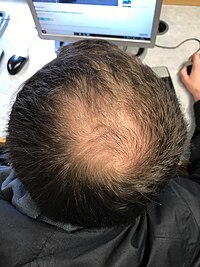
Photo from wikipedia
Background Alopecia areata is a chronic inflammatory skin disease. Oxidative stress may contribute to the pathogenesis of this condition. Aim To evaluate the serum oxidative stress markers and antioxidant capacity… Click to show full abstract
Background Alopecia areata is a chronic inflammatory skin disease. Oxidative stress may contribute to the pathogenesis of this condition. Aim To evaluate the serum oxidative stress markers and antioxidant capacity in patients with alopecia areata. Methods This cross-sectional study was performed on 40 patients with alopecia areata and 40 healthy controls. The fasting blood sugar, C-reactive protein, lipid profile, and serum oxidative markers, including advanced glycation end products and advanced oxidation protein products, were measured in this study. Also, antioxidant enzymes, including paraoxonase-1, lecithin-cholesterol acyltransferase and serum ferric-reducing antioxidant power, were determined. Results The serum levels of advanced glycation end products and advanced oxidation protein products were significantly higher in patients with alopecia areata, compared to the controls (P < 0.001), whereas the levels of ferric-reducing antioxidant power, paraoxonase-1 and lecithin-cholesterol acyltransferase were significantly lower in patients with alopecia areata, compared to the controls (P < 0.001). The mean fasting blood sugar level was significantly higher in patients with alopecia areata, compared to the controls. The ferric reducing antioxidant power level was significantly associated with the percentage of hair loss (P = 0.01, r = 0.4) and the serum C-reactive protein level (P = 0.03, r = -0.3) in patients with alopecia areata. Limitations Since the current study had a cross-sectional design, no cause-effect relationship was established between alopecia areata and oxidative stress. The sample size of our study was also small. Conclusion Based on the present results, the oxidant-antioxidant enzymatic system is impaired in alopecia areata due to the increased oxidative products and decreased antioxidant activity.
Journal Title: Indian journal of dermatology, venereology and leprology
Year Published: 2022
Link to full text (if available)
Share on Social Media: Sign Up to like & get
recommendations!